Tattoos are no longer a fringe trend. These are now mainstream. From delicate wrist designs to full sleeves, body art is now common across nearly every profession. But what about nursing? Can nurses have tattoos?
The short answer: Yes, nurses can have tattoos. However, whether they can be visible during work depends heavily on hospital or clinic policies.
This question is very common for new nurses, sometimes even for experienced nurses. In case of a nursing interview, most hospitals have a specific interview dress code. So, if you are planning to get a tattoo with an interview ahead, do check the dress code information beforehand
Know the rules, policies, and professional considerations around tattoos in nursing, so you know what to expect whether you’re a nursing student or a practicing RN.
Can Nurses Have Tattoos?
1. Are Visible Tattoos Allowed for Nurses in Healthcare?
So, are visible tattoos allowed for nurses? The short answer is: it depends on where you work. Nursing is a profession with deep traditions of professionalism, but workplace policies have evolved over time. What’s acceptable in one facility may be frowned upon in another.
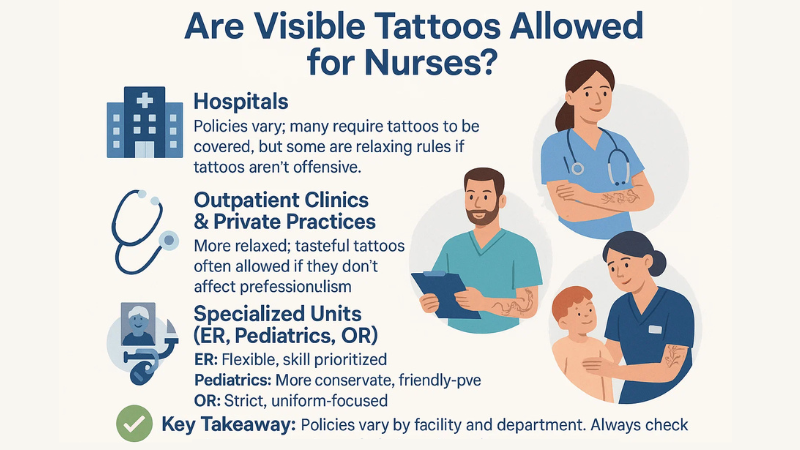
Hospitals
Most large hospitals have clear appearance policies. Some are fairly strict, requiring nurses to cover all tattoos with long sleeves, bandages, or makeup. This is especially true if tattoos are large, brightly colored, or located on visible areas like the hands, neck, or face.
That said, more hospitals are starting to relax these rules—as long as the tattoo isn’t offensive, distracting, or inappropriate.
Outpatient Clinics & Private Practices
Smaller clinics and private practices often take a more relaxed approach. As long as tattoos don’t interfere with patient comfort or professionalism, many facilities allow nurses to show them. Patients may even view tasteful tattoos as a sign of relatability and approachability.
Specialized Units (ER, Pediatrics, OR)
- Emergency Room (ER):
Policies are often flexible because speed, skill, and quick action matter most.
- Pediatrics:
Some facilities prefer a more conservative appearance to maintain a family-friendly environment.
- Operating Room (OR):
Strict rules are common here, with an emphasis on sterility and uniformity.
✅ Key Takeaway
Whether visible tattoos are allowed for nurses depends largely on the facility’s culture, department policies, and patient population. If you’re starting a new role, it’s always best to ask during orientation or check the employee handbook so you know the expectations upfront.
2. Hospital Policy on Nurse Tattoos: Strict vs Relaxed Rules
When it comes to tattoos in healthcare, there’s no single standard rule. Hospital policy on nurse tattoos can look very different depending on the institution, the patient population, and even cultural expectations in the region.
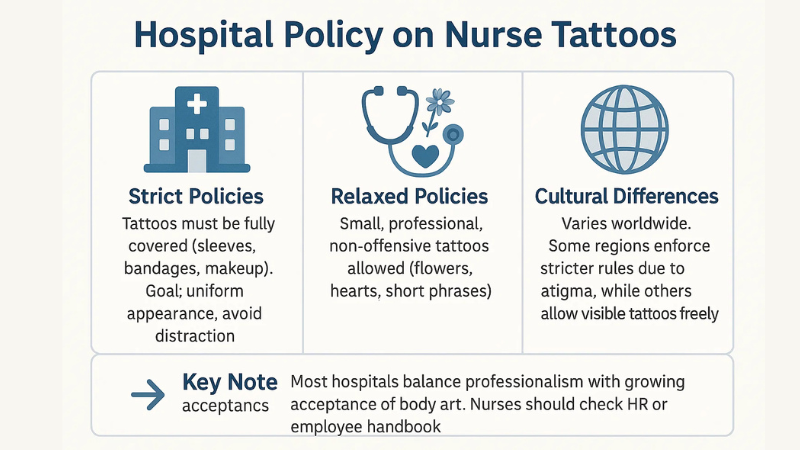
Strict Policies on Nurse Tattoos
Some hospitals still prohibit visible tattoos altogether. In these cases, nurses are expected to keep their tattoos covered with long sleeves, bandages, or even makeup during their shifts. The reasoning is usually to maintain a traditional, uniform appearance that avoids distracting patients or families.
Relaxed Policies and Modern Views
Other hospitals have adopted more modern views. As long as tattoos are small, professional, and not offensive, they may be fully visible. For example, a simple flower, heart, or inspirational phrase might be perfectly acceptable.
Cultural Differences in Tattoos and Nursing
Policies can also vary greatly depending on where you are in the world. In some regions, tattoos still carry a cultural stigma, and healthcare institutions enforce stricter rules. In other countries, tattoos are widely accepted, and hospitals rarely restrict them unless they are inappropriate.
In the end, most facilities try to create a hospital policy on nurse tattoos that balances professionalism with the growing cultural acceptance of body art. If you’re unsure about your workplace rules, the safest step is to ask HR or check the employee handbook.
3. Nursing Dress Code and Tattoos: What the Rules Say
When you think of the nursing dress code, you probably picture scrubs, badges, and comfortable shoes. But in today’s world, body art—especially tattoos—has become part of the conversation. Nursing schools, hospitals, and clinics often include tattoos under their official dress code policies, alongside rules about piercings, hair color, and overall grooming.
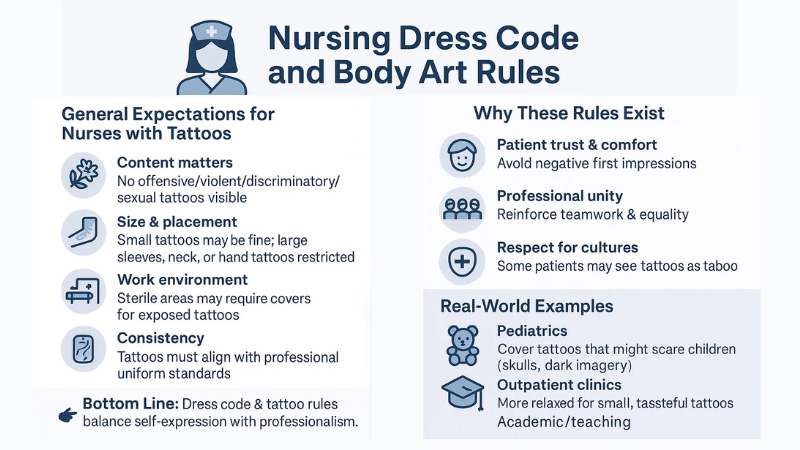
Why? Because nursing isn’t just about clinical skills—it’s also about trust, professionalism, and patient comfort. The way a nurse looks can influence how patients feel in moments when they’re already vulnerable.
General Expectations for Nurses with Tattoos
While policies differ, most healthcare facilities follow some common guidelines:
- Content matters first:
Tattoos with violent, offensive, discriminatory, or sexual imagery are almost never allowed to be visible. Even in more relaxed environments, these types of designs must be covered.
- Size and placement:
Small wrist tattoos or ankle designs might go unnoticed, but large sleeves, neck tattoos, or visible hand art often raise concerns. Facilities may ask nurses to wear long sleeves or skin-toned covers to maintain a professional image.
- Work environment considerations:
Sterile or surgical environments sometimes require short sleeves for infection control. That means tattoos on the arms or shoulders could end up exposed—so policies often require an extra layer or special cover when possible.
- Consistency with uniform standards:
Just like scrubs need to be clean and shoes need to be practical, tattoos need to fit within a hospital’s bigger goal of projecting professionalism.
Why Hospitals Enforce Tattoo Rules
It’s not that hospitals want to limit individuality. In fact, they want you not only to have an outstanding nursing resume but also to look professional and approachable. These rules are built around:
- Patient trust and comfort:
Imagine an elderly patient who grew up when tattoos were associated with crime or rebellion. Even if times have changed, their first impression might still carry that bias. Hospitals want to avoid anything that might make a patient feel uneasy.
- Professional unity:
A nursing team should appear consistent and reliable. When everyone follows the same dress code, it reinforces teamwork and equality.
- Respect for diverse cultures:
In some regions, tattoos are still considered taboo or disrespectful. Hospitals with international patients may set stricter rules to respect cultural sensitivities.
Real-World Examples
- In a pediatric unit, nurses may be asked to cover tattoos that could scare or confuse children (like skulls, dark imagery, or large abstract art).
- In outpatient clinics, policies are usually more relaxed, especially if tattoos are small and not distracting.
- In teaching or academic settings, dress codes lean formal—tattoos may need to stay covered to uphold authority and professionalism.
Bottom line: Nursing dress code and body art rules aren’t about erasing identity—they’re about balancing self-expression with professionalism. If you’re starting a new nursing job, it’s always smart to cover your tattoos until you know the facility’s policy.
4. Do Tattoos Affect Nurse Professionalism?
If you’re an aspiring nurse with tattoos, you’ve probably wondered: Will people take me less seriously because of my ink? It’s a valid concern, especially since healthcare is often seen as a conservative profession.
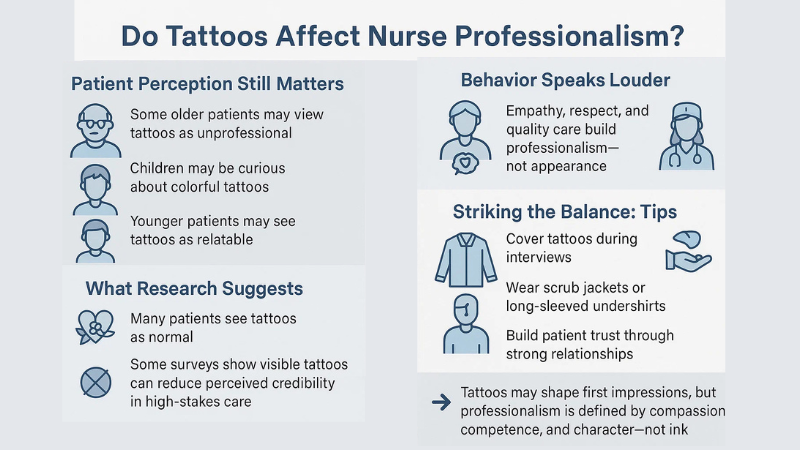
The truth is, tattoos can influence first impressions—but they don’t define your professionalism.
Patient Perception Still Matters
Patients come from all walks of life. Some may barely notice your tattoos, while others—particularly older generations—might still associate them with being “unprofessional” or even intimidating. For example:
- A child may be curious about a colorful tattoo, asking questions during care.
- An elderly patient may feel uneasy if your tattoo depicts bold or dark imagery.
- Younger patients, however, might actually feel more connected to a nurse who expresses individuality through body art.
Healthcare is about patient comfort first, so hospitals design policies that lean toward minimizing distractions.
What Research Suggests
Studies on tattoos in healthcare show mixed reactions. Many patients today view tattoos as normal and acceptable. But some surveys reveal that visible tattoos can still negatively affect how patients perceive a nurse’s credibility or professionalism—especially in high-stakes settings like surgery or intensive care.
That means tattoos aren’t automatically a problem—but they can add an extra layer of bias that you’ll need to overcome with professionalism.
Behavior Always Speaks Louder Than Tattoos
Here’s the most important point: professionalism is built on your actions, not your appearance. A nurse who communicates with empathy, provides excellent care, and treats every patient with respect will earn trust—tattoos or not.
Think about it: Would you care if your nurse had a sleeve tattoo if they were the one who comforted you through a difficult diagnosis? Probably not.
Striking the Balance
If you’re worried about tattoos affecting your image as a nurse, here are some practical tips:
- Cover your tattoos during interviews or until you know the facility’s policy.
- Choose scrub jackets or long-sleeved undershirts for professional settings.
- Focus on building strong patient relationships—because once patients know your skills and compassion, the tattoos fade into the background.
Bottom line: Tattoos may shape first impressions, but your true professionalism comes from compassion, competence, and character—not the ink on your skin.
5. Can Student Nurses Have Tattoos?
If you’re a nursing student with tattoos, you’re probably asking yourself: Will my ink be a problem in school or during clinicals? The short answer is yes, you can have tattoos—but the rules are often stricter for students than for licensed nurses.
Nursing School Tattoo Policies
Most nursing programs have a professional dress code, and tattoos usually fall under this. Why? Because schools want to prepare students for real-world hospital standards. That often means:
- Tattoos must be completely covered during labs, simulations, and clinical placements.
- Bright or bold tattoos that draw attention are often discouraged.
- Policies may differ depending on whether your school partners with conservative or more relaxed healthcare facilities.
Clinical Rotation Tattoo Rules
Here’s where things really matter: during clinicals, you’re technically representing both your nursing school and the hospital you’re assigned to. If the facility requires nurses to cover tattoos, you’ll need to do the same. This could mean:
- Wearing long sleeves under scrubs.
- Using bandages or tattoo covers.
- Avoiding short-sleeved uniforms if your program allows choice.
Think of it as practice for the professional world—learning to adapt to each workplace’s expectations.
How Professors and Preceptors View Tattoos
Even if your tattoos are tasteful, instructors may ask you to keep them discreet. Why? To minimize distractions and maintain a uniform, professional appearance. Preceptors want patients to focus on your care skills, not the artwork on your arm.
Best Practice for Nursing Students
Until you know the policy for sure, the safest choice is simple: cover your tattoos. Once you graduate and land a job, you’ll be able to adapt to your specific hospital or clinic’s rules—which may be more flexible.
Bottom line: Student nurses can have tattoos, but covering them during school and clinicals is usually required. Think of it as part of learning how to present yourself professionally in any healthcare environment.
6. Tips for Nurses With Tattoos
Having tattoos doesn’t mean you can’t thrive in nursing — it just means you need to be thoughtful about how you present yourself. Here are some smart strategies to keep your ink professional while still expressing your personality:
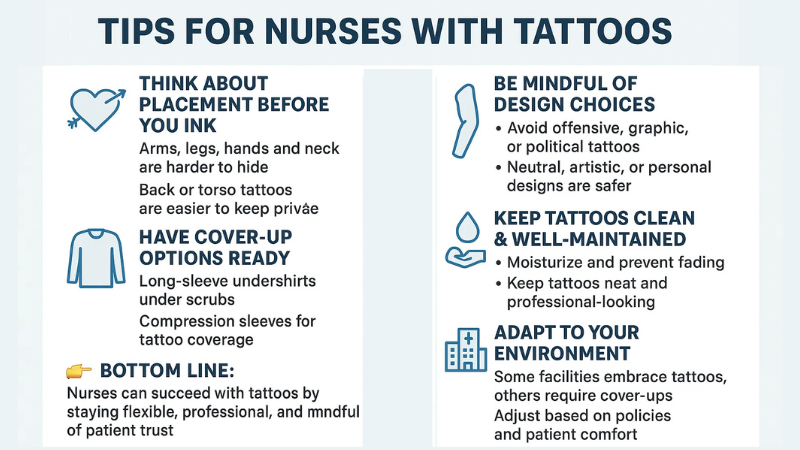
Think About Placement Before You Ink
If you’re planning a new tattoo, consider how visible it will be in scrubs. Areas like the arms, legs, hands, and neck are harder to hide and may need to be covered depending on hospital policy. Tattoos on your back or torso are usually easier to keep private.
Have Cover-Up Options Ready
Even if your workplace allows tattoos, there may be times when covering up is required — like during a patient interaction, an evaluation, or in a stricter unit. Practical cover-ups include:
- Long-sleeve undershirts beneath scrubs.
- Compression sleeves designed for tattoo coverage.
- Skin-toned bandages or specialized makeup for smaller tattoos.
Being prepared shows flexibility and professionalism.
Be Mindful of Design Choices
Healthcare is a people-focused profession, and patients come from all walks of life. Tattoos that are offensive, graphic, or politically charged can make patients uncomfortable and hurt their trust in you. Neutral, artistic, or personal tattoos are less likely to raise concerns.
Keep Your Tattoos Clean and Well-Maintained
Remember, tattoos are part of your visible appearance. Faded or poorly cared-for ink can look unprofessional. Moisturize regularly, avoid letting tattoos peel or crack, and make sure they look as well-groomed as the rest of your presentation.
Adapt to Your Environment
One facility may embrace tattoos, while another may expect them covered. The most successful nurses are those who can adapt without resistance. Think of it as part of patient-centered care — you adjust not just for policies, but also for the comfort of the people you’re helping.
Bottom line: You don’t have to give up tattoos to be a great nurse. By making smart choices about placement, design, and presentation, you can balance personal expression with the professional standards of healthcare.
7. Changing Attitudes Toward Tattoos in Healthcare
Not too long ago, tattoos in nursing were considered taboo. Nurses were expected to wear crisp white uniforms, keep their appearance spotless, and follow strict grooming rules. Back then, body art didn’t fit the image of “professionalism.”
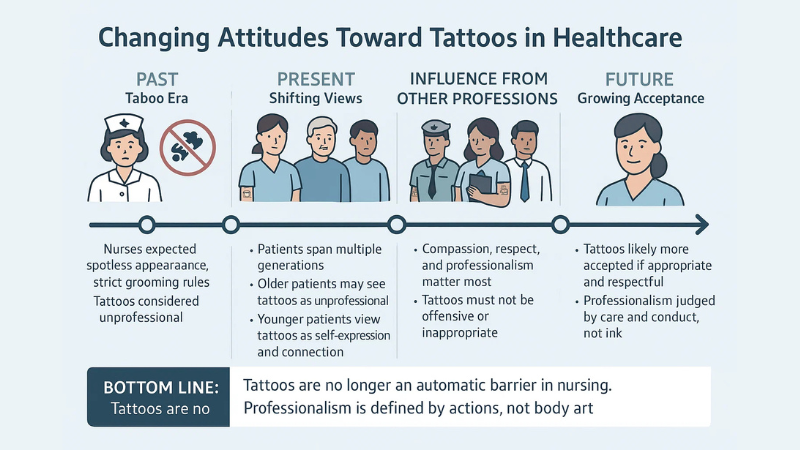
But the world doesn’t stand still — and neither does healthcare.
A Shift in Patient Perception
Today’s patients span multiple generations. While older patients may still associate tattoos with unprofessionalism, younger generations often see tattoos as normal self-expression. Some even feel more connected to a nurse who looks “real” and approachable rather than strictly formal.
Influence from Other Professions
The shift isn’t happening in nursing alone. Many traditionally conservative fields — like the military, education, and corporate workplaces — have softened their stance on tattoos. As society evolves, healthcare is gradually catching up.
What Hospitals Focus on Now
More hospitals are beginning to realize that professionalism is about actions, not appearance. Instead of automatically banning tattoos, they’re asking:
- Does the nurse treat patients with compassion and respect?
- Are tattoos free of offensive or inappropriate imagery?
- Does the overall appearance still inspire confidence and trust?
In most cases, the answer matters more than the ink.
Looking Ahead
If the current trend continues, tattoos in healthcare will likely become even more accepted — provided they’re appropriate, respectful, and well-presented. In other words, the future is less about hiding who you are and more about proving your professionalism through your care and conduct.
The bottom line: nursing is shifting with the times. Tattoos are no longer an automatic barrier, and as long as you balance personal expression with professionalism, your ink doesn’t define your abilities.
Pros and Cons: Visible vs Covered Tattoos for Nurses
Option | Pros | Cons |
Visible Tattoos | Express individuality- No need to hide artwork- Increasing acceptance in modern workplaces | May be seen as unprofessional by older patients- Possible policy conflicts- Risk of negative first impressions |
Covered Tattoos | Safe for conservative hospitals- Maintains traditional professionalism- Avoids offending patients | Can be uncomfortable (long sleeves, bandages)- May hide personal identity- Extra effort needed daily |
Conclusion: Can Nurses Have Tattoos and Still Be Professional?
So, can nurses have tattoos? Yes — absolutely. Having tattoos does not stop you from becoming a nurse or from thriving in your career. What really matters is how you show up for your patients: your compassion, your skill, and your professionalism.
That said, visibility does play a role. Some hospitals or nursing schools may ask you to keep tattoos covered, while others are much more relaxed. The key is knowing your workplace policies, being respectful of patient perceptions, and making sure your body art never distracts from the care you provide.
FAQs: Can Nurses Have Tattoos?
Can nurses show tattoos at work?
Yes, if the hospital policy allows. Many require tattoos to be covered, especially if they are large or offensive.
Do hospitals allow visible tattoos on nurses?
Some do, some don’t. Policies vary by institution, department, and location.
Do tattoos affect nursing job opportunities?
Not always, but visible tattoos may limit options in conservative hospitals or departments.
What are the tattoo rules for nursing students?
Most nursing schools require tattoos to be covered during clinical placements.
Are small wrist or ankle tattoos acceptable in nursing?
Yes, as long as they are discreet and not offensive. Covering them may still be required in some facilities.

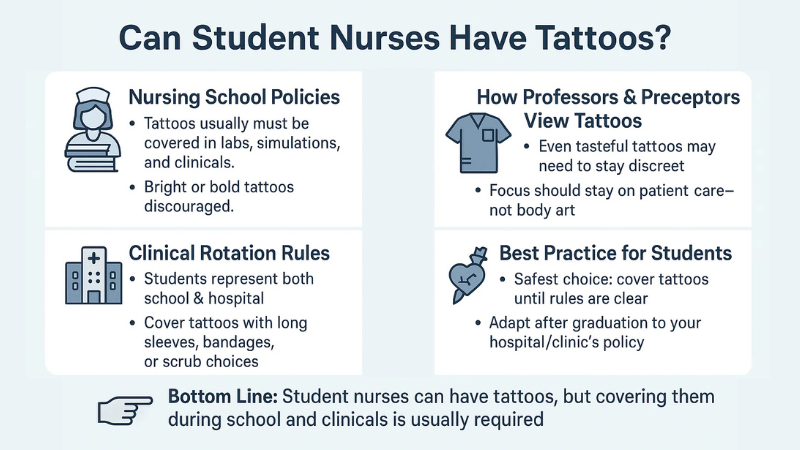
Leave a Reply